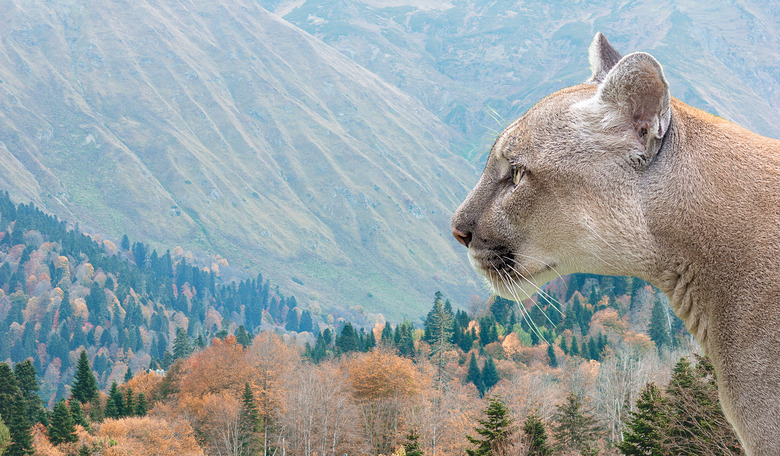What Are Cougars' Enemies?
Cougars are feline mammals native to the Americas. There are six subspecies of cougar, five of which are found only in Latin America.
Mountain lion enemies don't threaten the cougar via predation; cougars have no natural predators. They do, however, compete with gray wolves and grizzly bears for resources and can come into conflict with these animals as a result.
The greatest enemy and one of the only true cougar predators is humankind. Although cougars are a protected species, it is currently legal to hunt them in many U.S. states. While responsible hunting does not threaten cougar numbers, the species is threatened by other human-caused factors such as erosion of habitat and depletion of natural prey.
Mountain Lion Classification
Mountain Lion Classification
Cougars are also known as mountain lions, pumas, catamounts and panthers. Mountain lions range from Canada, all throughout the United States and throughout South America.
The mountain lion scientific name depends on the subspecies you're talking about since there are six subspecies. The species found in North America are called Puma concolor.
These animals are a part of the felidae family, which is most commonly referred to as the cat family. They're related to other large cats like the leopard, the tiger, the African and Asian lion and the jaguar. Like all felines, cougars are obligate carnivores, which means they must eat meat in order to survive.
Grizzly Bears
Grizzly Bears
Grizzly bears and mountain lions have similar diets that require them to hunt for similar species and use similar resources when populations overlap in habitat. This is known as competition.
In a 1998 study published in the journal "Ursa," researchers studied interactions between grizzly bears and cougars in Glacier National Park, Montana, from 1992 to 1995 and in Yellowstone National Park, Wyoming, from 1990 to 1995. The study found bears often displaced cougars from their kills.
It also found cougars displaced from their kills by bears lost an average of 17 to 26 percent of their daily energy requirements. Such encounters are only likely to occur when competition for food becomes intense.
Gray Wolves
Gray Wolves
In a study published in "Ecoscience," researchers detailed their studies into interactions between cougars and gray wolves in Banff National Park, Alberta, over a 12-year period from 1993 to 2004.
The study concluded that wolves were responsible for cougar mortality and usurping prey carcasses from cougars, but cougars failed to exhibit reciprocal behavior. Cougars are susceptible to wolf attacks when the two species are forced to compete for food.
Because the cougar is more powerful than the gray wolf, wolves are only a danger to cougars when they attack a solitary cougar as a wolf pack.
Hunting
Hunting
Cougars were once common throughout the U.S. However, prized by hunters and loathed by farmers for the impact they had on livestock, their numbers were severely depleted during the 19th century. By the early years of the 20th century, they were largely eliminated from the Midwest and Eastern states.
The remaining cougar population has stabilized with responsible hunting, but while quotas are imposed in those states where it is legal to hunt them, cougars remain under threat from illegal hunting/poaching.
Environmental Threats
Environmental Threats
The greatest enemy of the cougar is environmental change caused by humans. Although "The International Union for Conservation of Nature (IUCN) Redlist" of threatened species does not categorize the cougar as an endangered species, it does acknowledge that the species is declining.
In its 2008 "Puma Concolor Assessment," the IUCN concluded that cougars are threatened by habitat loss and fragmentation. The assessment also found that road kills are the principal cause of mortality in the endangered Florida cougar subpopulation, and heavily traveled roads are a major barrier to puma movements and dispersal.
Cite This Article
MLA
Sutton, Dominic. "What Are Cougars' Enemies?" sciencing.com, https://www.sciencing.com/cougars-enemies-8044192/. 22 November 2019.
APA
Sutton, Dominic. (2019, November 22). What Are Cougars' Enemies?. sciencing.com. Retrieved from https://www.sciencing.com/cougars-enemies-8044192/
Chicago
Sutton, Dominic. What Are Cougars' Enemies? last modified August 30, 2022. https://www.sciencing.com/cougars-enemies-8044192/
